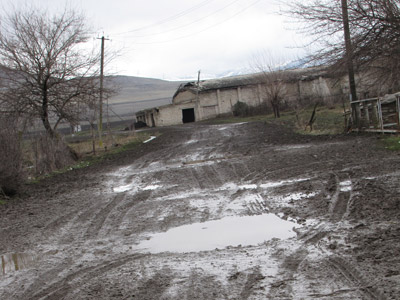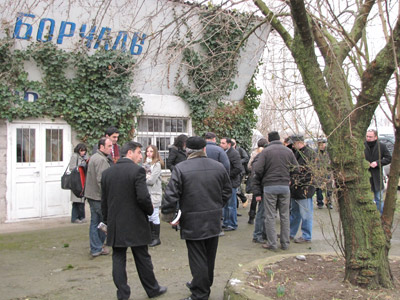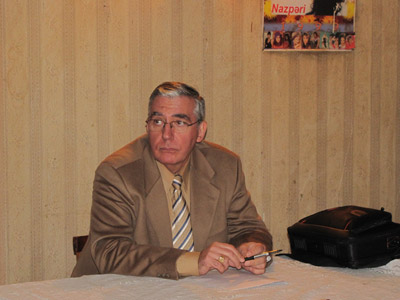Tekali, Georgia: the geographical center of the South Caucasus, a village equidistant from Armenia and Azerbaijan. Desolation and dirty houses mixed with the muddy slushes of March reflect the level of interest the region’s three countries have toward each other.
Hills separate settlements populated by Armenian and Azerbaijani residents: on one side, is the Armenian-populated Berdavan village; on the other, the Azerbaijani-populated Shikhly. The foot of the hills contain land mines, so that, as explained on site, “Armenians and Azerbaijanis don’t run into each other.”
Let’s return to Tekali, or rather, the decrepit village building “Borchali” which is used for large gatherings. Borchali — the old name of the Kvemo-Karli region — is now mainly populated by Azerbaijanis.
On the yellowed walls of the hall posters of various Azerbaijani singers and performers are seen. The largest poster, however, depicts Georgian President Mikheil Saakashvili: a promotional poster with a photo taken three years ago asking the electorate to vote for him in the presidential elections.
The simple hall, set up like a courtroom, was separated into a gallery (for spectators) and a bench and counsel tables (for the judge and counsels). Human rights activist Georgi Vanyan (pictured in the middle below), taking on the role of the judge, announced the start of the hearing “Georgia’s mediation in the Armenian-Azerbaijani conflict.” Conflictologist Georgy Khutsishvili was to argue in support of Georgia’s mediation, while political analyst Mamuka Areshidze was to argue against. About three dozen journalists, NGO representatives, videographers and photographers from the three South Caucasus countries were gathered together in the hall.
The expert witness was the chair of Georgia’s Parliamentary Committee on European Integration, a member of the ruling party, David Darchiashvili, however, he left to attend a parliamentary session in Tbilisi before listening to arguments, managing to stretch by 30 minutes his speech on the “Russian factor in the Karabakh conflict, which is not as obvious as in Abkhazia and South Ossetia.” He then added: “Russia has shown in Sochi who has leverage and in whose hands lies the resolution of the Karabakh issue.” In any case, the deputy said it was a pity that “the disagreements of the two oldest and most powerful nations are so intertwined.”
The hearing began. The position of Georgy Khutsishvili (pictured below) in favor:
Since the situation is explosive and already qualified by some analysts as an antebellum (the time period preceding a war), taking into account the interests of the parties, the search for innovative approaches to the issue of peaceful settlement of the Karabakh conflict has to occur immediately.
We don’t have regional experience in mediating conflicts in the South Caucasus, thus the idea of inviting Georgia to this role is worth at least a theoretical consideration.
There are factors which are conducive to this objective. They are:
– The juxtaposition of all three countries in the historical region of the Caucasus
– The positive experience of cultural interaction among the three nations in the pre-war period
– Georgia’s stable and balanced relations with both Armenia and Azerbaijan
– Georgia’s absence of unresolved territorial inter-state conflicts with Armenia and Azerbaijan
– Georgia’s direct acquaintance with protracted ethno-political conflicts and humanitarian crisis experience
– The inability of international organizations in South Caucasus conflicts — mainly the UN and the OSCE — to find mechanisms for enforcing peace or working out mutually acceptable terms for the parties to sign a peace treaty
– Protracted and fruitless attempts of the Minsk Group and international organizations to revive the Karabakh negotiation process
– Azerbaijanis’ distrust of Russia as a mediator (which serves as a unifying factor for Azerbaijan and Georgia, though it is alarming for Armenia)
– The knowledge in Georgian society (at least with respect to Abkhazia) of the need for establishing confidence-building measures with breakaway regions (ex. speaking to Abkhazia’s leaders directly) as a precondition for peace talks
– The dominant view in Georgian society that it would be possible to talk to the Abkhaz and Ossetians if not prevented by Russia
Among the common arguments against Georgia’s mediation are the following:
– Asymmetry in relations between Georgia and Azerbaijan on one hand, and Georgia and Armenia on the other, including: lack of balance in positions, intensity of cooperation, different domestic policy vectors and attitude toward the Russian factor
– Azerbaijan’s negative attitude toward the inclusion of Karabakh in the negotiation process (Azerbaijan has always had a more categorical stance on this issue than Georgia in relation to its breakaway regions, although recently there is a tendency towards convergence of their positions)
– Armenia’s and Azerbaijan’s diametrically opposite views on the August 2008 crisis and the roles of Georgia, Russia and South Ossetia in these processes
– The rapprochement of Georgia’s and Azerbaijan’s leadership, especially after August 2008, on conducting negotiations outside the conflict scheme with respect to breakaway regions
– The possible (highly probable) negative attitude toward the idea of Georgian mediation by such an influential geopolitical player as Russia
The position of Mamuka Areshidze (pictured below) “against”:
When we speak of Nagorno-Karabakh, the word “occupation” is recalled on the same level as “self-determination” and “separatism.”

Photo by Onnik Krikorian
The parties have been warring for over 20 years and despite the apparent efforts by the international community, everything is still the same. That some major players involved in the conflict settlement pursue their goals and interfere with each other is a fact. And the positions of the conflicting parties are steadfast. In light of this situation, the idea of Georgia’s mediation seems frivolous and is intentionally “proposed” to further exacerbate the conflict.
However, assuming the authors of this idea have good intentions, a number of arguments “against” can still be put forth.
– Georgia has negative experience in resolving conflicts on its own territory
– Georgia, being active, can cause the ire of nationalists on both sides and with that, disrupt the already shaky equilibrium in the South Caucasus
– Certain forces against a resolution to the Karabakh conflict can exacerbate relations between Armenian and Azerbaijani residents of Georgia
– Georgian mediation will anger Russia, with all its ensuing consequences
– The lack of political resources in Georgia can help stimulate a new war in the South Caucasus
It should be taken into consideration that despite the apparent good relations between Georgia and its neighbors, there are a number of contentious issues (for example, the border) that will instantly emerge in the case of Tbilisi’s involvement.
At the end of his speech, Areshidze nevertheless admitted that “in general, Georgian can participate in the [negotiations] process, but not as the primary player.”
It was highlighted in comments from committee members and statements from spectators that the “against” position had more powerful arguments and Areshidze was speaking about the actual situation, which, however, is not acceptable for most of the region’s population.
Thus, Georgy Khutsishvili’s few utopian “for” positions received the overwhelming support of voters, who decided to be realistic and demand the impossible (a slogan of the Situationists during social upheavals in Europe during May 1968).
The organizers of the hearing were Caucasian Centre for Peace Initiatives (Armenia), Alliance of Women for Civil Society (Azerbaijan), the Tekali Association (Georgia), with the support of the National Endowment for Democracy (US).
Main photo of hands raised, voting by Onnik Krikorian.
 Epress.am News from Armenia
Epress.am News from Armenia




